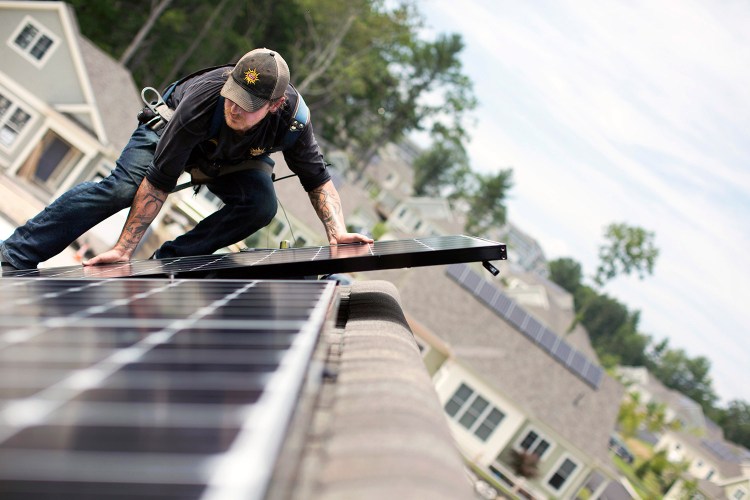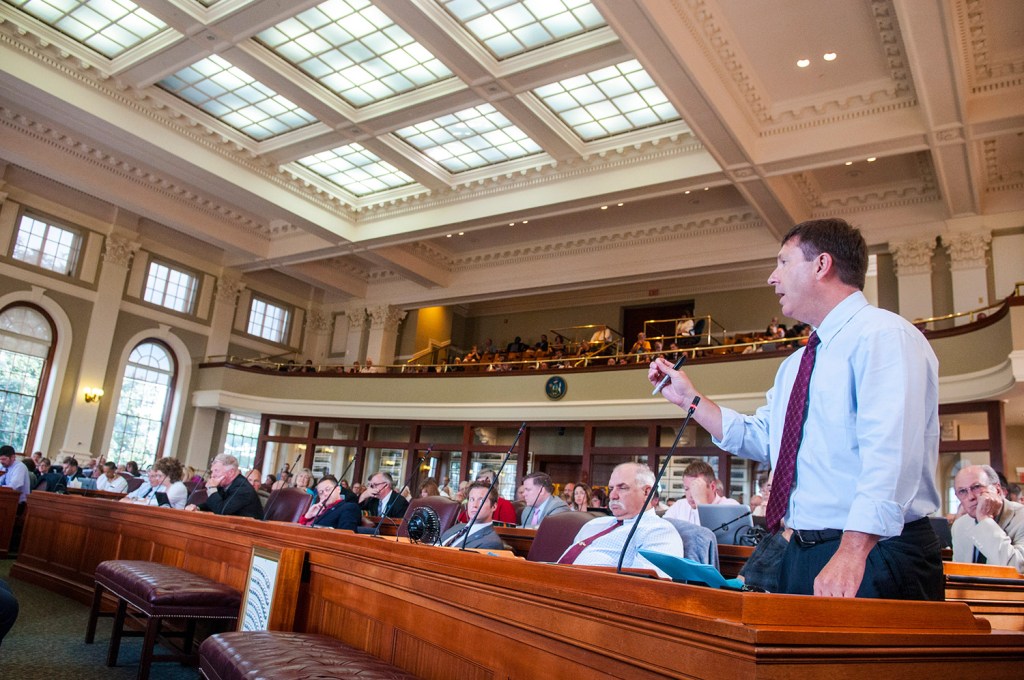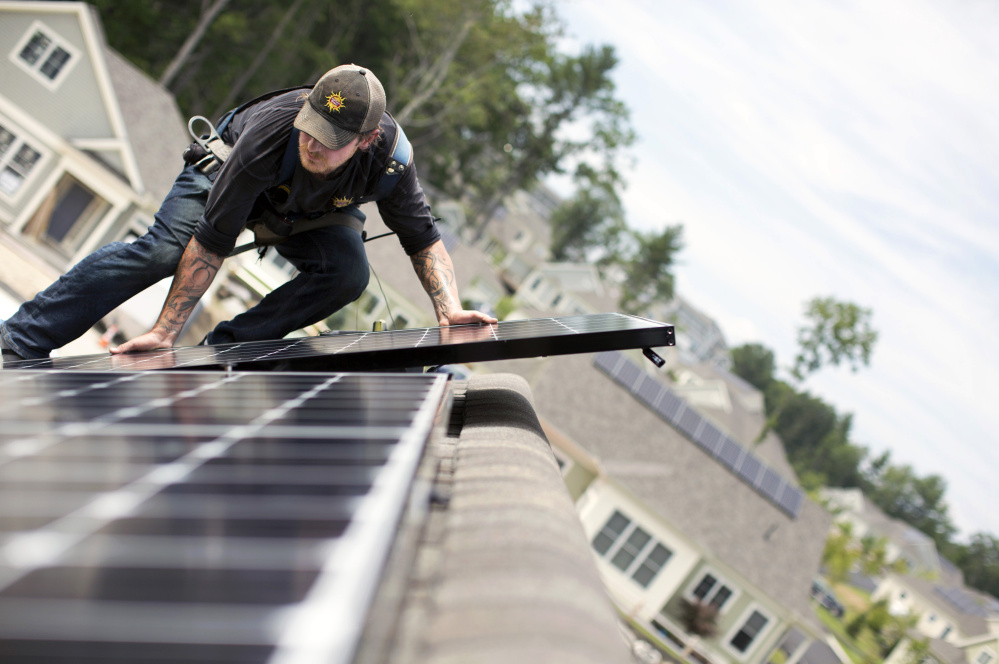The Legislature heeded warnings from Maine’s largest utility company about higher electric rates Wednesday and narrowly sustained a veto by Gov. Paul LePage of a bill that would have temporarily kept the current financial incentives in place for rooftop solar panels.
The veto override easily passed in the Senate, 28-6, but it failed in the House, 88-48, falling three votes short of the two-thirds majority needed to override.
L.D. 1504 had won strong initial support in both chambers, but that support faded in the House as Republican allies of the governor cast doubt about the bill’s impact on electric customers, and even its constitutionality.
Had it survived, it also would have directed the Maine Public Utilities Commission to study the costs and benefits of solar.
The vote capped months of debate and lobbying and in many ways became a political litmus test for renewable energy. It marked the second year in a row that LePage has seen his veto of a key solar bill sustained by a narrow margin.
The vote also was a significant victory for Central Maine Power Co. The state’s largest utility company had mounted a multifaceted effort to convince lawmakers of the harm that would befall electric customers if the bill became law.
Solar supporters expressed their disappointment.
“Despite the bill’s overwhelming passage in June and widespread public support, clean energy in Maine has once again fallen victim to Gov. LePage’s and utilities’ anti-progress stance,” said Emily Green, an attorney at the Conservation Law Foundation.
The Natural Resources Council of Maine, which worked hard to build support for the bill, also cited the influence of utilities in the outcome.
“Today, too many lawmakers turned their back on jobs of the future for Maine and bowed to pressure from the Governor’s Office, Central Maine Power, Emera, and other utility and fossil fuel industry groups from across the nation,” said Dylan Voorhees, the group’s climate and clean energy director. “They failed to support the small businesses that are struggling to create and sustain jobs from Kittery to Fort Kent, and they ignored the need and desire to transition to cleaner, renewable energy sources.”
A VICTORY FOR CONSUMERS?
Glen Brand, director of Sierra Club Maine, said the vote means that Maine will continue to lag behind other states in developing local, reliable and affordable solar power.
“It also means more carbon and toxic air pollution and dependence on dangerous, dirty and expensive fossil fuels,” Brand said.
Unlike nearby states such as Vermont and Massachusetts, Maine doesn’t offer solar incentives such as state-backed credits and rebates, or property and sales tax exemptions on solar units.
LePage declined to comment after the vote. But his communications director pointed to the governor’s veto letter last month, in which he said solar incentives shift costs to the poor and elderly.
A spokesman for CMP said the vote was a victory for consumers, by protecting those who have already installed solar systems while starting to rein in costs that CMP says are shifted unfairly to non-solar customers.
“This will benefit all customers,” John Carroll said.
House Republican Leader Ken Fredette, who was instrumental in marshaling opposition within his party, echoed the comments about cost shifting and said it was critical to keep power costs as low as possible for all Mainers.
“People are free to put solar on their rooftops if they choose, but other Maine ratepayers should not be forced to pay for it,” he said.
Fourteen members of the House were absent for the vote, and seven Republican representatives who supported the measure when it originally passed 105-41 changed their position and voted against overriding the veto: Richard Bradstreet of Vassalboro, Rich Cebra of Naples, Carol McElwee of Caribou, Heidi Sampson of Alfred, Stedman Seavey of Kennebunkport, Tom Skolfield of Weld and Nathan Wadsworth of Hiram.
Wednesday’s outcome also sets the stage for a pending rule approved by the PUC, which will gradually phase out a key financial incentive for homeowners who install solar-electric panels. That rule, which has been criticized for elements that include a requirement that new panel owners have two electric meters to record generation and use, is set to kick in Jan. 1.
But environmental activists confirmed Wednesday that they will challenge the rule in court, adding further confusion to the future of rooftop solar in Maine.
Sean Mahoney, executive vice president of the Conservation Law Foundation, said briefs are due in two weeks at the Maine Supreme Judicial Court. The suit, which will be joined by the Natural Resources Council of Maine, industrial customers and solar installers, will specifically challenge provisions in the rule that would assess a transmission charge on solar customers for the electricity that they generate and use at home.
“It’s like Hannaford trying to charge me for the tomatoes and lettuce I grow at home and therefore don’t have to buy from their store,” Mahoney said.
BATTLING FACTIONS
The pros and cons of L.D. 1504 had been hotly debated, with supporters and detractors citing statistics about the costs and benefits of solar incentives. The parties made their case through various means, including on social media and in newspaper op-ed columns. Most recently, lobbyists on both sides of the issue stepped up efforts to influence how lawmakers would vote.
As with many energy issues, details matter, and supporters and opponents presented their own calculus, coming up with figures that were millions of dollars apart. The division became increasingly stark in recent days.
While LePage has long been the public face of the opposition, recent actions by CMP made the utility an even more influential player in working to torpedo the bill.
Tensions mounted when Sara Burns, CMP’s president and chief executive, wrote a column published in the Portland Press Herald on July 18 that asserted incentives for rooftop solar owners could cost customers $150 million more through 2035. That and other factors led to lawmakers putting off a vote on the veto override when they convened to consider outstanding bills on July 20.
Solar supporters accused Burns of scare tactics, and she later acknowledged that her $150 million figure reflected a worst-case scenario. It contradicted estimates from the Maine Office of the Public Advocate that the bill would actually provide customers with a modest savings.
The episode contributed to a climate of mistrust that only intensified this week, when the bill’s Republican sponsor, Sen. Tom Saviello of Wilton, arranged a meeting with CMP lobbyists, solar advocates and Senate President Mike Thibodeau to seek a compromise. But CMP declined to support proposed amendments, leading Saviello to vent his frustration Wednesday in a Press Herald column.
CONTROVERSIAL CREDITS
The debate over state government’s role in encouraging solar electric generation in Maine has grabbed a lot of attention in recent years. Advocates of continued or expanded financial incentives see them as investments that pay off in clean, locally produced energy and jobs that are the foundation of a growing industry. Critics, including LePage and CMP, the state’s largest utility, say the incentives increase rates and shift costs onto other electric customers.
At the heart of the dispute has been what to do about net metering. Also known as net-energy billing, this arrangement gives solar panel owners a 100 percent credit for the retail value of excess power that they feed back into the electric grid.
Net metering was devised in the 1990s to encourage renewable energy development. Opponents say its obsolete in an era when the cost of solar panels has fallen dramatically. But homeowners have come to expect net metering, and it has become part of the business model for rooftop solar installers. For these and other reasons, net-metering rules are being debated and modified across the country.
Last year, a broad solar bill that would have set up a new form of compensation failed by two votes when the Legislature couldn’t override a veto by LePage. That set the stage for a proceeding at the PUC, which ended in the pending net-metering rule that would gradually reduce the incentive beginning in 2018.
That rule was widely criticized. Solar installers said the rollback and other elements would cripple their industry and stunt the kind of job growth taking place in other states.
Tux Turkel can be contacted at 791-6462 or at:
tturkel@pressherald.com
Twitter: TuxTurkel
Send questions/comments to the editors.






